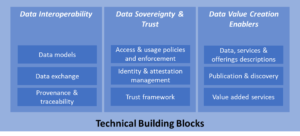Gaia-X
Gaia-X developed a Trust Framework and Labelling Framework that safeguard data protection, transparency, security, portability, and flexibility for the ecosystem as well as sovereignty and European Control.
The Trust Framework is the set of rules that defines the minimum baseline to become part of the Gaia-X Ecosystem. These rules ensure a common governance and the basic levels of interoperability across individual ecosystems, while giving the users full control over their choices.
The Trust Framework uses verifiable credentials and linked data representation to build a FAIR knowledge graph of verifiable claims from which additional trust and composability indexes can be automatically computed.
